
Delfina Foundation, London
4 October – 20 November 2023
by TOM DENMAN
When you stare at something for a very long time and allow the mind to wonder freely, things come to the surface (of the imagined or metaphorical plane of vision) that you may want to ascribe with meaning. Or you may see something in something, reassociate – via dissociation – one shape or form with another. This kind of languorous noticing and connecting – mental habits crucial to our digitally conditioned consciousness, and crucial, the works here seem to tell us, to our habits of escapism – might describe the experience conjured by Farah Al Qasimi’s most recent photographs, now shown along with a new video work at her first UK solo exhibition. Printed on a visibly solid surface and framed without a mount, the photographs forcibly break the code of their immaterial conception and push back at us slightly, denying easy absorption. This makes it hard to find a visual anchor at first – our gaze lingering in a dissociated, soft-focus mid-range – then the eyes are caught by a detail, and an unnameable and often discomfiting reality dawns.
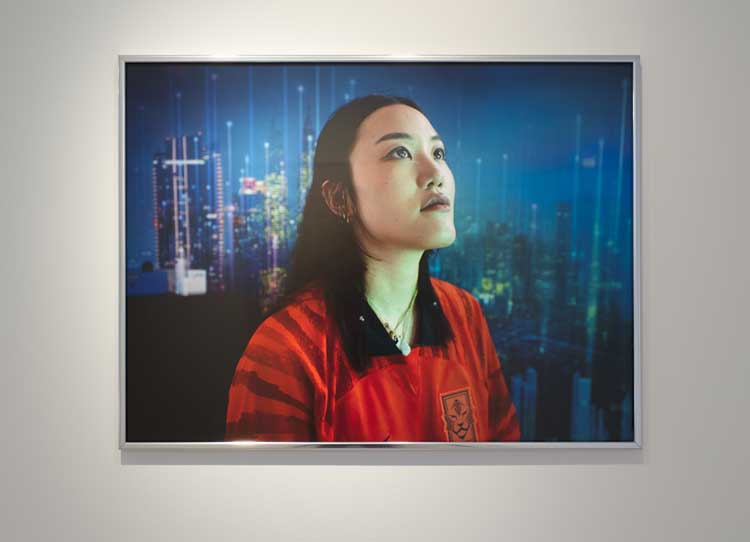
Farah Al Qasimi, Abort, Retry, Fail, 2023, installation view, Delfina Foundation, 4 October - 20 November 2023. Supported by Abu Dhabi Festival. Photo: Tim Bowditch.
Take for example Gia Wearing Contact Lens (all works 2023): a woman gazes upwards, her face illuminated. At first, the image may strike as generic, calling our attention primarily by its presence in a gallery. The subject has a model-like face; the overall luminosity – complete with the glittery cityscape background, seen through what appear to be floor-to-ceiling, high-rise windows – carries the ideological trappings of advertising, with the texture reminiscent of a billboard (sometimes, because of this, the photographs in this show have the sense of being “found,” erring on readymade, materialising the snapshot as a chance object). Yet the work is riddled with conflict and contradiction, grappling with what it means to look and record looking, to attend to something and be absorbed by it. The gesture of applying a lens to the surface of the eye merges vision and touch in a way that resonates with the digitally produced image’s almost-roughness. In parallel with this congruity of sensations, grounded tactility and candid contingency are countervailed by – as they also countervail – transcendence: in Gia’s gaze, in the vertical pattern of lights behind her, and in the sports top she wears, if we are to recognise the latter as a signifier of the pursuit of dreamed-for glory.
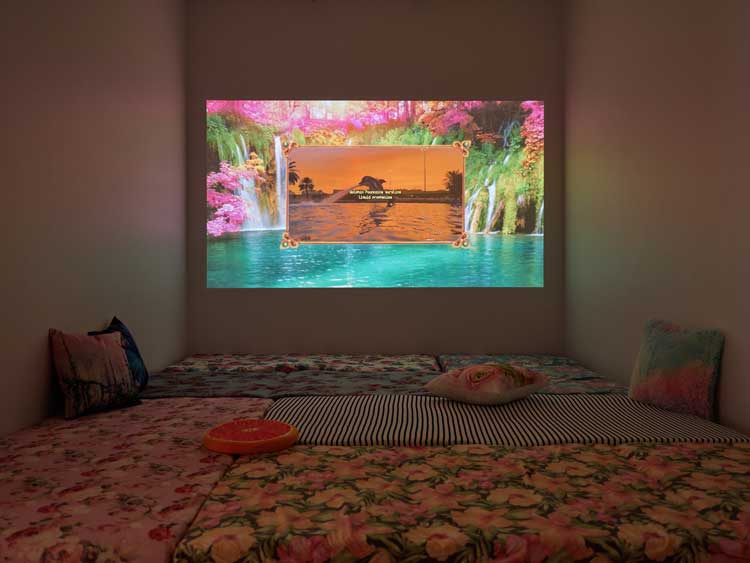
Farah Al Qasimi, Abort, Retry, Fail, 2023, installation view, Delfina Foundation, 4 October - 20 November 2023. Supported by Abu Dhabi Festival. Photo: Tim Bowditch.
The nature of this transcendence is hard to pin down. It often verges on what might best be described as escape or dissociation. The video work Signs of Life includes a bed of floral, fairytale cushions for us to lie on, as if to assist our stupefaction. Mimicking an in-between moment in a videogame – complete with catchy, low-bit music – the film is inset against a (still) tropical backdrop, and in it nothing much happens (the gaming context, suggesting that something should be about to happen, accentuates this inactivity). The footage reports a walk through countryside and edgeland dereliction, repeatedly alighting on an abject waterpark. Drifty, noncommittal phrases come in and out of view. The feeling is one of lostness, loneliness, in the face of the possibility of climate catastrophe. And yet there is also detectable, within the dissociation itself, a longing for some form of reconnection, with people, with the environment, that transcends the self. This is partly grounded in the artist’s process, especially with regard to the photographs, which are of her friends. Gia appears alone, almost an icon, and yet the work is also an intimate snapshot; like the lenses she is wearing, the instance of capture is a (fragile) point of contact. If Al Qasimi’s transcendence is escapism, it is an escapism that breaks at the seams.
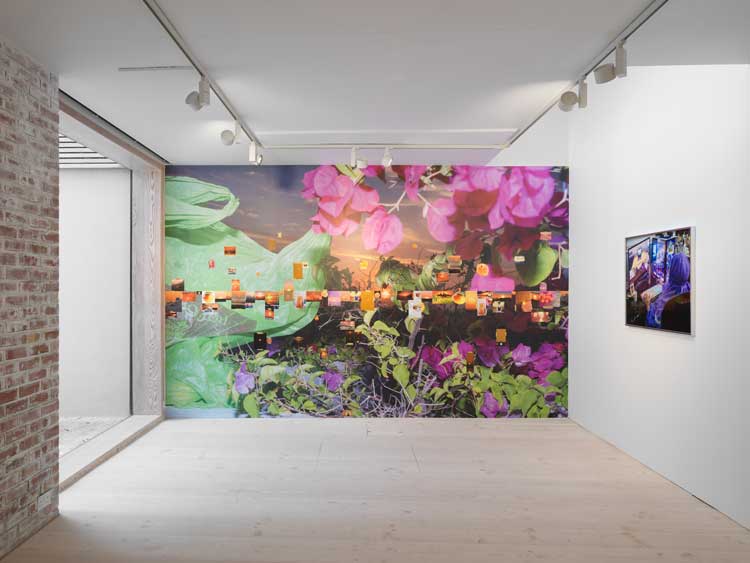
Farah Al Qasimi, Abort, Retry, Fail, 2023, installation view, Delfina Foundation, 4 October - 20 November 2023. Supported by Abu Dhabi Festival. Photo: Tim Bowditch.
In Anood Playing House Flipper, another of the artist’s friends sits at a desk looking at a computer screen on which there is another desk on which there is another computer. The game, which involves the simulated renovating of homes, actively elicits our imagined bodily absorption, here enacted through the layering of dimensions and the surrogate viewer/player. Zooming in, we may be drawn to the orange key at the top left of the keyboard, on which, instead of “esc” (as would normally appear on a UK or US keyboard), is written “ascend”. This contingent conflation of escape and ascendence does not seem to be telling us that, for Al Qasimi, videogaming offers transcendence (although some games can do this by connecting people). Rather, to lose oneself in a game like House Flipper is to enact the desire to transcend beyond the self and have a practical effect on one’s environment; that it does not manifest any of this in real terms, that it might be diametrically opposed to such action, is intrinsic to the Sisyphean tone of Al Qasimi’s subversion.
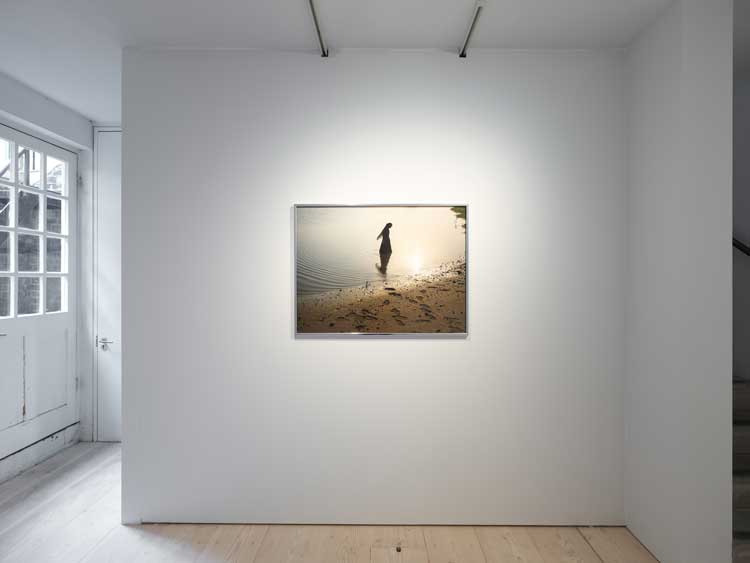
Farah Al Qasimi, Abort, Retry, Fail, 2023, installation view, Delfina Foundation, 4 October - 20 November 2023. Supported by Abu Dhabi Festival. Photo: Tim Bowditch.
It is to Al Qasimi’s credit that she does not brandish her political motivations, instead challenging us to grapple with the difficult ambiguities of what we see. One of the most politically semaphoric works here is Dolphin Fountain, featuring the same waterpark seen in the video: an utterly terrifying artificial dolphin lurches rigidly against an ominous sun, such that the jet of water firing from its rostrum could really be a reference to fire. In its industrial, overheated context, this sad simulacrum of nature monumentalises humanity’s self-infantilised avoidance of environmental responsibility. Contrast this with Azra in the Water – an image of tranquil embodiment centring on the haptic contact of bare feet, sand and water, and yet this is not without political foreboding. The geographic clue of Azra’s headscarf combined with the water hints at climate emergency, ripples and footprints signalling connection but also consequence. These two images are intelligently kept apart; pairing them would risk reducing the exhibition’s unsteady mosaic of crosscurrents to a single dialogue.
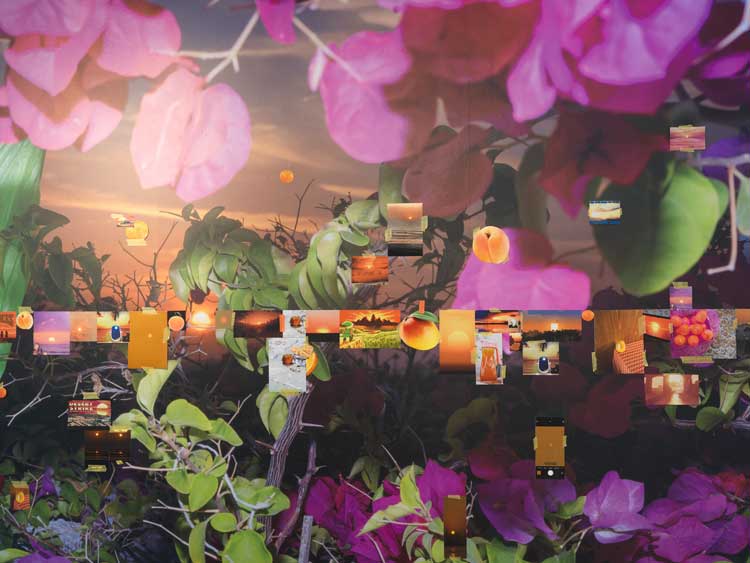
Farah Al Qasimi, Abort, Retry, Fail, 2023, installation view, Delfina Foundation, 4 October - 20 November 2023. Supported by Abu Dhabi Festival. Photo: Tim Bowditch.
And so the works appeal to our inner detective, for whom clues are found in the dialogue between frames or in the seemingly circumstantial: a computer key, a cup stain, the edge of a contact lens, the roundness of the sun (three of which are circles, now I think about it, and the cuboidal key is the same colour as the sun). Rather than lead to conclusive answers, the clues ask us to ponder the search for meaning itself. Such mapping is enacted in Horizon Study, which consists of a Warburgian atlas of ominous red suns and comparably shaped and coloured things – a peach, a mango – taped to photographic wallpaper featuring wayward plastic, vegetation, and that recurring angry red sky. The show’s title also derives from a seemingly insignificant detail: “Abort, Retry, Fail,” as contingent as it is appropriately absurdist, appears in the corner of an old, black-backgrounded computer screen, itself at the edge of a photograph centring on a glass of pink soda. If the words suggest mind-numbing, fatalist surrender, this is a real mood that Al Qasimi relays to us as a gesture of active protest.
Maggi Hambling: ‘The sea is sort of inside me now … [and] it’s as if...
Maggi Hambling’s new and highly personal installation, Time, in memory of her longtime partner, To...
Caspar Heinemann takes us on a deep, dark emotional dive with his nihilistic installation that refer...
Complex, multilayered paintings and sculptures reek of the dark histories of slavery and colonialism...
Shown in the context of the historic paintings of Dulwich Picture Gallery, Rachel Jones’s new pain...
William Mackrell – interview: ‘I have an interest in dissecting the my...
William Mackrell's work has included lighting 1,000 candles and getting two horses to pull a car. No...
Marina Tabassum – interview: ‘Architecture is my life and my lifestyle...
The award-winning Bangladeshi architect behind this year’s Serpentine Pavilion on why she has shun...
A cabinet of curiosities – inside the new V&A East Storehouse
Diller Scofidio + Renfro has turned the 2012 Olympics broadcasting centre into a sparkling repositor...
Plásmata 3: We’ve met before, haven’t we?
This nocturnal exhibition organised by the Onassis Foundation’s cultural platform transforms a pub...
Ruth Asawa: Retrospective / Wayne Thiebaud: Art Comes from Art / Walt Disn...
Three well-attended museum exhibitions in San Francisco flag a subtle shift from the current drumbea...
This dazzling exhibition on the centenary of John Singer Sargent’s death celebrates his versatile ...
Through film, sound and dance, Emma Critchley’s continuing investigative project takes audiences o...
Rijksakademie Open Studios: Nora Aurrekoetxea, AYO and Eniwaye Oluwaseyi
At the Rijksakademie’s annual Open Studios event during Amsterdam Art Week, we spoke to three arti...
AYO – interview: Rijksakademie Open Studios
AYO reflects on her upbringing and ancestry in Uganda from her current position as a resident of the...
Eniwaye Oluwaseyi – interview: Rijksakademie Open Studios
Eniwaye Oluwaseyi paints figures, including himself, friends and members of his family, within compo...
Nora Aurrekoetxea – interview: Rijksakademie Open Studios
Nora Aurrekoetxea focuses on her home in Amsterdam, disorienting domestic architecture to ask us to ...
Kiki Smith – interview: ‘Artists are always trying to reveal themselve...
Known for her tapestries, body parts and folkloric motifs, Kiki Smith talks about meaning, process, ...
Frank Auerbach, Britain’s greatest postwar painter, has a belated German homecoming, which capture...
How Painting Happens (and why it matters) – book review
Martin Gayford’s engrossing book is a goldmine of quotes, anecdotes and insights, from why Van Gog...
Jonathan Baldock – interview: ‘Weird is a word that’s often used to...
As a Noah’s ark of his non-binary stuffed toys goes on show at Jupiter Artland, Jonathan Baldock t...
Helen Chadwick: Life Pleasures
Helen Chadwick’s unwillingness to accept any binary division of the world allowed her to radically...
Catharsis: A Grief Drawn Out – book review
To what extent can the visual language of grief be translated? Janet McKenzie looks back over 20 yea...
Radical Software: Women, Art & Computing 1960-1991
With more than 100 works by 50 artists, this show examines the pioneering role of women in computer ...
Dame Jillian Sackler, the art lover and philanthropist, has died aged 84...
Giuseppe Penone: Thoughts in the Roots
With numerous works created with the twigs, leaves, roots, branches and majestic forms of trees, thi...
Solange Pessoa: Pilgrim Fields
An olfactory orgy of marigolds, chamomile, grasses, sheepskins and kelp is arranged into a surreal l...
Christian Krohg: The People of the North
A key figure in Norwegian art, naturalist painter Christian Krohg wanted his art to bring social cha...
This comprehensive show charts the groundbreaking rise of the illustrated poster in 19th-century Fra...
Caspar David Friedrich: The Soul of Nature
This comprehensive show celebrating last year’s 250th anniversary of the Romantic painter’s birt...
A humongous survey of contemporary painting in Belgium shows a medium embracing the burden of its hi...
A retrospective of the first 20 years of the Max Mara Art Prize for Women finds an inexhaustible wel...